PeopleWatching

Crispijn de Passe the Elder: Noah leaving the ark with his family and animals: at left Noah's family carries supplies, at right animals descend on a ramp from the ark, above birds fly from the ark, from a series of engravings for the 'Liber Genesis' (1612)
" … even if your quarter horse provides none of the entertainment."
I've always been a sucker for a parade. Few anticipations excite me more than the one that comes when I'm on my way to watch a parade, even when I know for certain that most of the 'units' will be lame. I love waving at people floating by in spotless mid-century convertibles and I'm stirred by every marching band. When we lived in Takoma Park, Maryland, which sponsors a Cracker Jack 4th of July parade, theirs included a yoga drill team which would march for half a block, then stop to perform poses. The 911 Truthers always fielded a provocative float, and one year, neighborhood dads organized a Grill Team, which performed synchronized marching while pushing gas grills in front of them. The best of the best have always been the happened-upon ones, like that year we came up from a Manhattan Flatiron neighborhood subway station to find ourselves experiencing the annual gay pride parade cruising by, with Cyndi Lauper on the back of some fire station's flatbed float belting out Girls Just Wanna Have Fun, surrounded by dancing shirtless hunky firefighters wearing spangly hot pants and bright red fireman helmets. That experience could change anyone's life!
Covid Shutdowns limit the opportunities for attending parades, but the real attraction of them was always the PeopleWatching opportunities they afforded.
Psycholitics
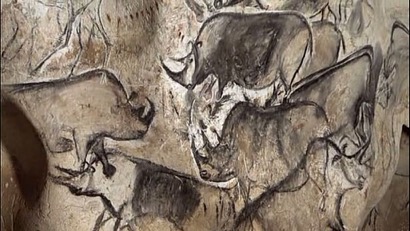
An artistic depiction of a group of rhinos in the Chauvet Cave (30,000 to 32,000 years ago)
"We are much older and more experienced than Our Founding Fathers ever became."
The United States is not the only sovereign nation where serious psychological problems have been codified into the law of the land. However brilliant and breath-taking Our Revered Founding Fathers' work might have been, it also served as psychological self-portraiture, partly aspiration and partly indictable by modern standards. It codified prejudices intolerable in our more enlightened times, just as our entitlements will over time inexorably seem insufferable conceits to those we leave behind us. For instance, our treasured Second Amendment, as presently interpreted, encourages self-destructive reactions to paranoid delusions, so people buy guns to protect themselves from people who buy guns, which further encourages people to more buy guns to protect themselves from people who more buy guns. It's become a recursively runaway psychological social disorder guaranteed by our Constitution: Psycholitics. Each successive generation is more experienced than its predecessor. All carping aside about society's evolutionary entropy, there's ample observable evidence that we're, as a people, actually maturing over time; better coping. Behaviors accepted as representing righteousness have over time become intolerable evidence of racism, classism, misogyny, grand larceny, and murder in the first degree. Conservatives seem determined to preserve some sorry legacies in the interest of decency, a calculation that understandably drives progressives crazy. Of course, contravening historical precedent drives the originalists insane. The result seems to be a Body Psycholitic, a society undergoing particularly difficult ongoing therapy with the goal of ultimately getting over itself. It's also a fairly accurate portrait of Hell, an under-appreciated price of self-governance.
Psychologist and counsellor Eugene Kennedy suggested, "The things about me that drive you crazy are the things that keep me sane."
Scholarshit
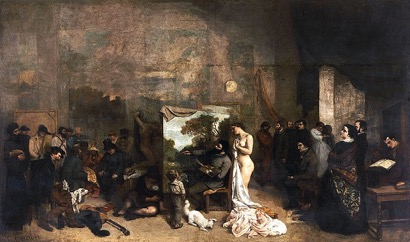
Gustave Courbet: The Painter's Studio: A real allegory summing up seven years of my artistic and moral life (L'Atelier du peintre) (1855)
" … just a form of confirmation I was then too naive to accept."
No amount of even the most diligent study would have ever turned me into an astronaut, a result which blesses more than curses us all. From my now lofty perspective, poised as I now am upon the tail end of my existence here, it's becoming ever clearer to me that there might have been some curious pre-destiny involved in determining who and what I would become, that it was never, even for a moment, an open book or a matter of studious diligence. The writing might have seemed much clearer had I understood how very near I had always been to whatever I might become. I was apparently never destined to become President, even though that possibility was early on promised me as a birthright American baby, where anyone might become whatever they muster the will to imagine themselves becoming. I knew early on that I would never become one of those gas station mechanics with an embroidered Dave on my shirtfront, or a cop, or an electrical engineer. It was never nearly as clear who I might become as it was who I never would end up being.
My studies, such as they were, disclosed whispers. I knew what could hold my attention and what induced a coma, though my teachers ascribed a lack of dedication to my more obvious shortcomings, as if an additional ounce or two of diligence might make a real difference.
SecondOrderFatigue

The Tired Dancer: John Reinhard Weguelin (1879)
"I live right up close to that edge."
I've been dog tired before, and bone weary, and sick and tired plenty of times, but I confess to feeling even more exhausted this time. I've put my time in on the factory line, twelve endless hours performing the most mindlessly repetitive motions, but that was nothing in comparison to this subtle sickening feeling. This endless evening in isolation might do the infamous Chinese Water Torture proud for how it cows and humiliates me. Born into a land firmly believing itself to be both proud and free, we're forcibly humbled before an utterly invisible enemy which steadfastly refuses to show itself. Many have already come to believe that this was always an imaginary foe, and every countermeasure an humiliating over-reaction, like fleeing from shadows vaguely flickering on our cave's moist wall. Before each fall came a clear call insisting all was well after all, that we had little to fear beyond an evidently irrational foreboding, and we set to no longer flee from that. Once contracted, there would be no fleeing backwards, back into the SecondOrderFatigue which so convincingly misleads each to presume an invulnerability never evident beforehand. Once infected, we'd experience fatigue for a wholly different reason.
I try each day to reinforce what I fancy to be my protective reasoning, for, like Robinson Crusoe's Man Friday, I feel as though I've been stranded three years, alone on some desert island and subsisting on goats.
Re-Ality
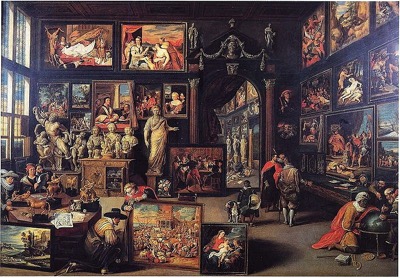
Willem van Haecht: Collection of Cornelis de Geest with Paracelsus (1630s)
" … the real one this time."
I find myself exhausted by the seemingly endless arrays of alternate realities offered to me each day. My choices overwhelm me. Which reality should I engage with today? The one just outside my window might have once been sufficient, but the many within just our modest Villa seem to dwarf and upstage it. Skimming my many books, each presenting a different perspective, could consume several lifetimes. TV, radio, podcasts, and things Internet each present slightly different representations of Re-Ality, each a little different, each somehow also the same. They each seem to try to characterize a separate reality in various degrees of believability. I consider my reality palate somewhat refined. I won't agree to swallow just anything. Sci-Fi, for instance, never qualified as either believable or entertaining to me. Reality TV seems far removed from any form of reality I've ever even imagined. I was blissfully unaware that such a character as a bachelorette even existed, for instance, until I was subjected to such a presence on a so-called reality TV show. But what do I know?
I once believed myself to be my own arbiter of reality, as if I got to choose which version I subscribed to, but I fear that I've somehow lost that ability, surrounded as I seem to be with so many perspectives seemingly far superior to my own.
Schmaltzing

George Frederic Watts: Hope (1885)
"My first and most prominent occupation has always been Schmaltzing."
When I look down from near the top of my family tree, I see the antecedents of what would one day result in me. Though they hardly lived in the manner to which I've grown accustomed, I imagine that their existences somehow informed mine, though I knew only the barest few of them and even those barely spoke of such things. My father's side of the operation seemed the most convoluted and diverse. The Muse managed to trace my father's mother's family clear back to Roman times in Gaul, where the patriarch was a Prefect, and his progeny became the crowned heads of Europe. My later line ultimately sprang from some later-born princess. My paternal grandfather's heritage seems much less diverse, simple Alsatian farmers, perhaps Jews coerced into Catholicism displaced by centuries of unrest, a sort of diaspora unto itself. From them, I inherited my Schmaltziness, a certain endearing cloying sentimentality I consider my primary defining characteristic. Though I know I'm genetically half my mother's Scotch/Irish heritage, I consider my Schmaltzing my emotional center, my underlying superpower.
It might be socially incorrect to consider genetics germane to anything, a form of phrenology about as defining as bumps on a head, a superstitious sort of social racism born of misbegotten understandings, and it might have been an accident that I was born with a surname that so accurately represents what I've always felt.
ForkAssed

Pietro della Vecchia: A fortune-teller reading the palm of a soldier (circa 1626-1678)
"I fear that I'm way too dependent upon what my forebears just adapted to in moments of sometimes overwhelming extremis."
According to the weather ForkAssed five nights ago, we would be experiencing much colder weather and snow this morning, so I spent the following five days anticipating its arrival, certain of my near future. This certainty encouraged me to thoroughly prepare, to tear down the summer garden, drain the hoses, stack the pots, and rake up the fallen pine needles. The Muse and I put away stores that might have serviced Admiral Perry's Antarctic Expedition. I switched out the screen door for the solid glass one. I spent yesterday's late afternoon swishing a broom over the front porch before just sitting there because I knew for certain I'd be sitting inside for the foreseeable future. Even the cats seemed to sense an impending end to just slipping up the hill to stalk field mice. Neither of them seemed to really want to come in, not even to extraordinary enticements. I empathized with their sentiments.
Once in, with the fireplace throwing heat, it's impossible to beat the cozy snowed-in feeling.
Badministration
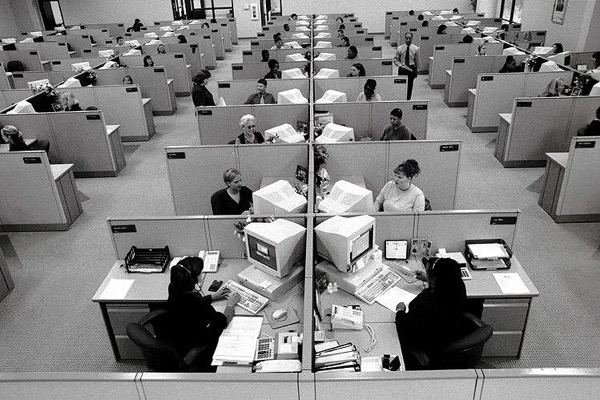
The Cube Farm
"An ounce of appreciation seemed to power the whole operation."
My first job out of business school found me supervising the Automatic Bank Check Unit of the Individual Insurance Administration Department of what I came to call The Best Of All Possible Mutual Life Insurance Companies In The Greater Portland Metropolitan Area, Bar None. It was the only mutual life insurance company in that area, but it still provided a truly terrific medium for learning about administration, the actual lifeblood of every organization. We learn to think of Business and Industry, even Government, as producing products and services, and they certainly do that, but each expends more effort administering that production, accounting for every damned thing, billing and collecting, and litigating disagreements. Whatever product a corporation claims to create, it's expending the bulk of its energies administering, administrating. The first rule of administration says, "Thou shalt remain steadfastly invisible," for prominence essentially renders administration useless. If every back office ministration means another runaround, it won't matter that you're selling the secret to eternal life, quickly, nobody will feel terribly moved to buy any. The key to effective administration has always been invisibility.
We speak today of 'seamless' transactions, the latest manifestation of a trend evident since people bartered with stones.
Cyclings

Laufrad des Freiherrn von Drais: "Draisine" or Dandy Horse, 1817 design
" … not the disrupters they first appear to be, but the unlikely connecters between what is and what might be …"
Each week seems to follow a similar pattern, enough the same as to encourage a sense of familiarity without necessarily reducing to completely numbing sameness; each different while also quite the same. For me, each week delivers some unanticipated failure which I so far seem to have always managed to overcome, as if each week had been served up to remind me that even I'm capable of recovery. This week, my blog server stopped serving me and the Customer Support Team suddenly stopped invisibly supporting me to become the obvious source of an apparently intractable difficulty. At first, as usual, I had no obvious alternative to continue delivering my accustomed daily production, and the seduction to simply crumble washed up and over me. Eventually, by which I mean by no means immediately, I came to understand that alternatives might surround me, and I set about choosing a viable one. By no means did this transfer occur smoothly, for I seemed to need to work my way back through the usual universal stages of acceptance. I experienced in succession: fear, anger, discouragement, reckoning, and then an only partially acceptable sort of acceptance. I experienced an amputation then came to acknowledge that the initially begrudged peg-leg replacement might suffice for now. I retain a sense of loss along with a lessening urgency to return to the way it was. I suspect that the longer this work-around extends, the more it will become what I'd always unknowingly intended what it replaced to become.
I make no shocking pronouncement when I insist that things do not work as advertised.
Undoing

Thomas Degeorge: Death of Archimedes (1815)
" … even eternity seems an endlessly moving target."
The sure and certain sign of Fall's victory over the Summer season comes when I finally accept that it's time to disassemble the deck garden. Lovingly created over a long June weekend, it can only last so long before every pot and planter will need emptying or risk shattering in the impending cold. Shelves return to the master bedroom to hold part of The Muse's extensive African Violet collection, their usual over-winter occupation. Lingering petunias pulled and packaged as garbage. Dahlia bulbs recovered for storage in a paper bag with peat until next Spring. Everything's got to go. Snow's predicted a few days from now and so it seems a great Undoing's required, though undoing implies more of a cycle than the effort actually entails. There will be no resurrection of either these plants or this garden, for next year, next Spring, we'll be cultivating different soil in a different place, so I do not need to carefully preserve the potting soil for reuse next year. We will not pack and ship the soil along with us, so I refresh the beleaguered flower beds with it. The yard looks fresh and ready for more than the six month snow bank soon to overtake it.
Hope always springs for me each autumn that there might actually be an Undoing, though there's only even a moving on involved.
RespectableAgain
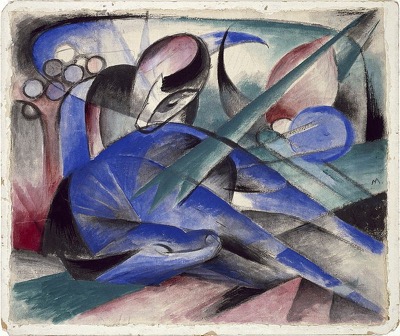
Franz Marc: Träumendes Pferd [Dreaming Horse] (1913)
" … as decency becomes RespectableAgain, finally!"
I decided early this morning to afford myself a little hopeful anticipation. With two weeks remaining before this election, it seems increasingly likely that decency will shortly become RespectableAgain. Through the current occupation, the man elected to perform the role of leader of the free world seemed incapable of showing respect toward anyone, including himself, and like any member in good standing of what my folks used to refer to as "the bad crowd," he encouraged a general debasement of the traditional rules of comportment. He seemed to work awfully hard to turn everything upside down and backwards, and only because he believed he could, and many—way too many—seemed to follow his lead just as if he was seducing freshmen into a previously inaccessible underworld. He tried to teach them to drink and smoke and avoid curfew violations, just as if not getting caught amounted to genuine freedom. A few seemed to flip entirely to the dark side. Others dabbled, but could not shake their inherited decency, their own unshakable paranoia sending them back into their families. Most of us looked on feeling horrified.
So this sense that some big changes are coming feels enormously reassuring.
EncroachingParadoxes
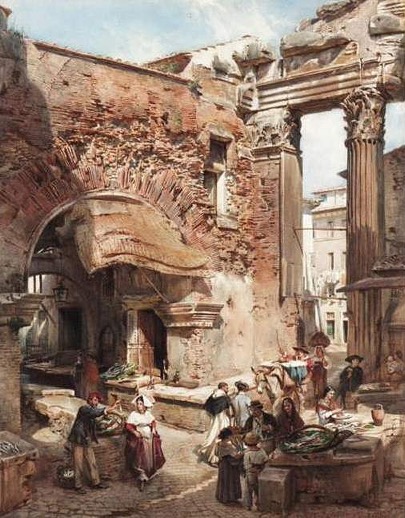
Ludwig Passini: Roman Fish Market at Sant'Angelo in Pescheria (1863)
"EncroachingParadoxes: experiences that make absolutely no sense at first …"
Beyond the senses, we each possess layers of additional sense-like resources such as reasoning, emoting, intuiting, and others. We employ these additional "senses" to make sense of experience, though this label might misrepresent our sense-making efforts. We probably over-rely upon reasoning as the ultimate gold standard method for sense-making, though reason, innocently applied, can't always produce understanding. Even scientists claim to rely upon sixth-sensing to noodle their way into and back out of complicated analysis. Pure reason, if it exists, might not reliably produce the most believable results. Rejecting reasoning probably makes analysis worse, so we seem stuck with paradoxes whichever methods we might choose. Intuiting lacks replicable rigor and emoting seems too mercurial, though both can add insight to an inquiry.
It might be that each technique cannot avoid the critique that it lacks some essential something.
HumanNature
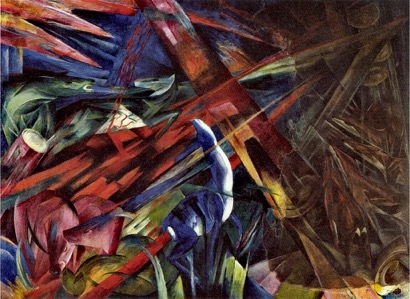
Franz Marc: Tierschicksale [Fate of the Animals] (1913)
"When it's already too late to learn better, we might finally start personally relating our own innate HumanNature …"
When The Plague hit Florence in the 1340s, people reacted similarly to how we've reacted to This Damned Pandemic today. I've long questioned just what it might mean to know something, for knowledge does not tightly correlate with behavior. Knowing something doesn't necessarily change anything I do. I suspect that this reaction stems from what I might characterize as an abiding Personal Sense Of Exemption, that even what I know for certain seems more likely to apply to others, but not directly to me. Speed limits seem to reinforce this proposition, since even when it seems clearly in everyone's benefit to obey them, a herd-like mentality seems to override caution, and almost everyone exceeds the limit, perhaps sensing that everyone else is getting away with something and that they don't want to feel cheated, especially that they might be cheating themselves. Personal imperiling to avoid feeling cheated might be HumanNature incarnate. We might just as well have dinner in that restaurant. Everyone else seems to be going and we wouldn't want to feel left out.
Describing HumanNature seems eerily similar to relying upon a fish to explain water, a fish so intrinsically immersed within the stuff that it might prove utterly invisible to any fishy observer.
StumpTheChecker

Franz Marc: Fuchse [Foxes], (1913)
"The odd, the British insist, are nearer to God."
Our Saturday larder-stocking excursions have continued in greater earnest since the Damned Pandemic lockdown orders kicked in. These represent the sole opportunity for The Muse to get out into the world, and though we cannot properly call these shopping trips, they provide some sense of possibility beyond talking to a basement wall, her usual occupation through the week. I usually make a couple of trips out to pick up odds and ends, but always alone and inevitably mission-focused, hardly recreational. The Saturday outings serve as our sole socialization, so we've continued them, albeit under extreme caution: Masks, a handy bottle of hand sanitizer, little lingering or investigating involved. We're pretty much in and back out again, following our Stations Of The Cross sequence from butcher to green grocer to supermarket to liquor store to fish monger, then home. Even this small variety in the numbing sameness can approach boring, so we've adopted a few diverting amusements which we incorporate into these days. We might listen to the latest Radio Deluxe podcast between stops because The American Songbook's always a welcome companion. We continue our infinite Slugbug competition, which seems friendly to a point nearing absurdity. We humbly genuflect when in the presence of Parking Karma, when The Gods provide a parking place nearest a store's front door. We most enjoy our ongoing game of Stump The Checker, though.
For those not already engaging in this competition, it's another one of those so-called friendly competitions where gaining actual points is never the point.
SchlockWare
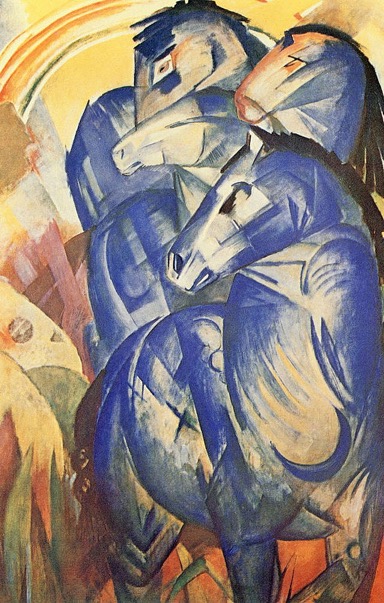
Franz Marc: The Tower of Blue Horses (1913, missing since 1945)
"Our virtual existence seems remarkably similar to our actual one."
Our Damned Pandemic has driven those of us not formerly living virtual lives into ever deeper virtuality, a rough mock-up analogue of what previously passed for reality. I meet weekly with a group of friends, few of which I've met face-to-face, employing Zoom, currently the most popular interface. I convene the gathering, but understand only the barest trace of how to operate it. I hunt and peck and generally succeed, learning a little more about it each week. I will never flawlessly invoke the screen share feature, probably because it was not designed for seamless invocation. I apologize in advance, then clumsily manage to share my screen after a couple of stumbles in between. We're all forgiving, for none of us have mastered the application, just like every piece of SchlockWare we've grown to rely upon. Not even superuser status would protect us from collectively stumbling when employing it, for I doubt that even its designers have fully mastered it, in the unlikely event that designers were even involved creating it.
Each 'app' seems to have outgrown its founding charter, intended for one purpose then serially upgraded to cover functions never imagined in its initial instantiation.
Bettering

Franz Marc: Blue Horse I, 1911
"Onward, not necessarily always upward!"
I understand that I'm supposed to be Bettering myself, but I struggle with sustaining even the barest semblance of my current status quo. It's not that I'm not Absolutely Dedicated To Achieving Excellence, it's more that I sense that I might just have already managed to mostly achieve good enough—if not for government work, then perhaps for mine. I've been told of the necessity for continuous improvement but doubt the proposition that every damned instance begs for Bettering. Could good enough never be … good enough? I understand that I could be better than I are, swinging on some star and all that, but the consequent paranoia seems a poor reward. If I'm not endlessly Bettering, will I never get no satisfaction? And if I am endlessly Bettering, does that not strongly suggest that I'm not yet worthy of achieving any satisfying anything? Where's the satisfaction in that endless Bettering? Continuous Bettering seems roughly equivalent to simply giving up, acquiescing to endless short-comings, never really done. How fun does that sound?
We say that we're a striving society, but we seem more of an exhausted one, or, maybe, simply fed up.
Openness
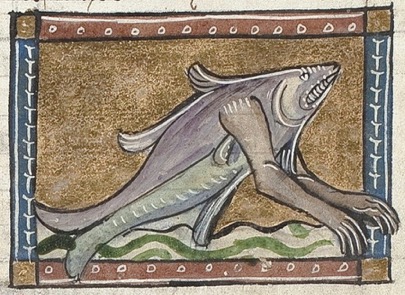
Illustration taken from the illuminated manuscript Der Naturen Bloeme: The Flower of Nature produced in Utrecht or Flanders (ca. 1350)
"I wish that Computer Scientists understood what computers were for."
There's probably nothing wrong with computing that fewer computer scientists couldn't help. An insurgency favoring Openness has grumbled within that field since its inception, with few signs of its imminent success. Propriety has ruled instead, with OpenSource taking its place as just another proprietary platform as far as most users are concerned. Earlier, the Macs battled the PCs without a conclusive decision. I sided with the Macs, though by making that decision, I'd chosen to have to translate everything I created into Klingon if I expected anyone without access to my more open (to me) propriety, and that I would have to translate from Klingon anything they sent to me. Yesterday, a friend sent me a file formatted as a .odt file, pure Klingon to me, unreadable in a whole new way. It came complete with imbedded HTML in the unlikely event that I felt like reading between the lines of code to unwrap the cryptic message within. So much for Openness.
I figure that Openness always qualified as a Utopian aspiration, anyway, for nothing in the natural world seems all that wide open to me or to anybody.
MediaDerangementSyndrome
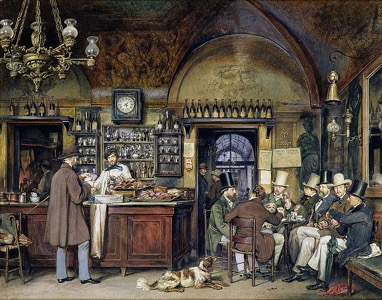
Ludwig Passini: Artist in Caffè Greco in Rome (1856)
"Sometimes I amaze myself, usually when I'm in the middle of debasing myself again."
I imagine that Cafe Society served as the social media of its time. Gentlemen would congregate around a table to share gossip and show off for each other. Women preferred tea. There were certain rules of comportment, depending upon the participants' social class. The more lowly barroom observed different customs than might a cafe, though each served similar purposes. We're social animals and we seem to need to bump shoulders if not heads to maintain our sanity. Church, too, served up socialization as much as religion, the congregating serving as perhaps its primary purpose, an antidote to stultifying isolation. Even then, a few reliably disrupted the regular order. When I was a kid, a piano left unattended in the corner of the church's multipurpose room would eventually attract some show-off aching to play Chopsticks, or that small portion of it requiring only two fingers to perform. The resulting disruption demonstrated neither mastery nor erudition, and should have properly embarrassed the aspiring performer, though it never seemed to wound his self-esteem, for he was suffering from a simple form of MediaDerangementSyndrome (MDS), a social disease which compels some to abuse whatever media they encounter. Give 'em a newspaper and it becomes a flyswatter, even when no flies seem present. Leave a microphone unattended and they'll feel compelled to yell into it, saying, "testing, testing," while hysterically giggling, but this condition's no joke.
In our more modern times, we've outsourced many of the old-time social venues to social media.
Queryering

Unknown miniaturist: Jean Miélot at his desk (2nd half 15th century)
"Nothing noteworthy ever comes into being without first erecting some scaffolding."
The smoke alarm on the twelve foot master bedroom ceiling started squealing at two thirty this morning, producing a piercing chirp every thirty seconds or so, a particularly cruel wake-up call. I failed to successfully ignore the alarm, though I felt shy about waking The Muse to ask if she'd mind terribly if I crawled up there to replace the battery, for she seemed to have been successfully sleeping through the intrusion. I fled downstairs, it being close enough to my usual wake up time, but even from there, the chirpy chiming proved distracting. I knew that quieting it would force an ordeal. I'd have to fetch the long collapsable ladder from the garage, wrestle it inside and upstairs, then perform the reverse origami unfolding in a tightly constricted space, the kind of operation best performed without critical eyes observing. I finally but reluctantly accepted the challenge, roused The Muse to ask her permission, then set about wrestling the ungainly ladder into place.
As expected, I delivered a performance without evident grace, even managing to scratch the wall in a place which might be next to impossible to repaint, in the unlikely event that we have some of that color of paint leftover in the basement.
FreedomOfScreech
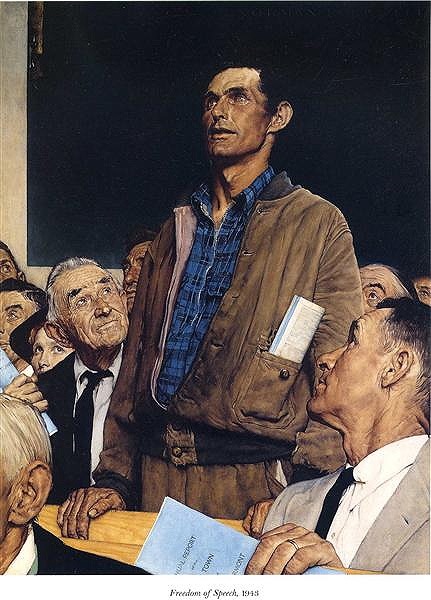
Norman Rockwell: Freedom of Speech (1943)
© by Norman Rockwell under Fair Use
"I ain't buying anything promoted with screeches."
Maybe The Founders intended elections to deeply upset the public, lest we grow lax in our responsibilities as citizens. During election season, our much-vaunted freedom of speech seems to expand into what I might more reasonably insist seems more like FreedomOfScreech. The most fantastic fictions masquerade as facts while facts cower in corners until after ballots get counted. We claim that voting amounts to our sacred right, though we treat it with little reverence. The SOB who never once seemed interested in representing you or me suddenly seems redeemed, clothed in whatever raiment seems most appropriate to appeal to a divided electorate, while deliberately further dividing that electorate. My mute button gets overworked as the same misrepresentations appear as gospel. I wonder why that local television station agrees to carry that advertisement and they respond with vague references to civic duty, which seems more of an indenture to me. At least election season serves to dramatically reduce my television viewing.
I apparently inhabit a backwater of political discourse since I've seen blessed few of the ads.
TinyTyranny

Mir Sayyid Ali: Persian Miniature Complex Palace Scene (1539–1543)
"I might have been more right than I knew."
Most of us sense the significance of anything larger than us. Big might not necessarily be better, but it's sure a whole lot more noticeable. We learn early not to sweat small stuff, for small doesn't usually represent any obvious threat. Dedicated to making some significant difference, we focus upon the bigger chunks, ones where, if we can influence them, we'll probably get noticed. Appearances aside, this bias for the big might imperil us most, for small changes, those which go unnoticed, seem to more readily replicate than the huge gallumping kind which quickly raise our defenses. An almost indiscernible one percent change, if persisted over time, can leave us wondering why in a radically different place. A spark becomes a blaze. A drip grows into a flood. We see ample evidence that tiny can become tyrannical, yet a TinyTyranny usually slips right through our defenses.
Innumeracy explains some of this condition.
Homering
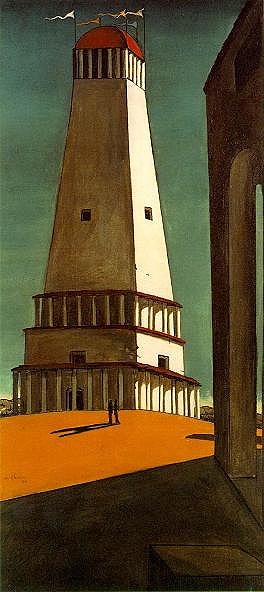
Giorgio de Chirico: The Nostalgia of the Infinite (1911)
"I might, finally, at last, accept that my future's fully back in my hands now."
As I noted yesterday, I caught myself feeling lost in the perhaps necessarily disorienting transition between then and WhatNext. I must have expected my world to crisply snap back into some poorly-remembered before state after The GrandOtter departed for her next adventure, but except for the suddenly empty guest bedroom and bath, the place remained disappointingly the same, essentially unchanged save for a notable absence of a persistent background hum. Every displaced routine remained disrupted and seemed reluctant to snap back into what I imagined to be its former place. Worse, I felt a deep reluctance to simply pick up the former pace, to fill the suddenly empty spaces with fresh ambition and activity. I sheltered more or less in place, staring at a too familiar face. Home would refuse to meet me halfway. I'd have to engage in some dedicated Homering.
Homering refers to a complicated process by which an imagined outcome becomes an actual one leached of nostalgia and Utopian expectations.
Hollowing
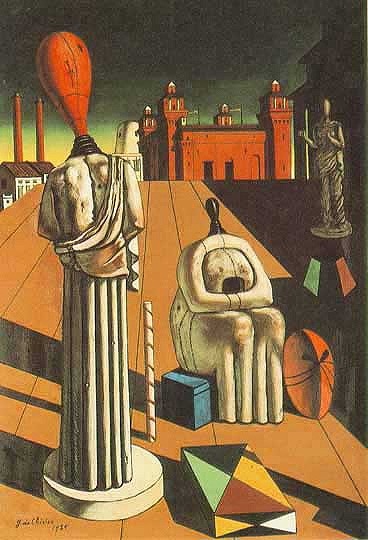
Giorgio de Chirico: The Disquieting Muses (1947)
" … a replacement obsessive purpose might shine through."
All my life so far, I've heard stories about the sweetness of success. These were fairy stories, apparently, for every one of my greatest victories have so-far most prominently produced a disorienting Hollowing instead. I might have gone absolutely all in to achieve something, only to feel upon completion the way Wylie Coyote must feel after overrunning his latest mesa top. A hollow hum replaces the rush and feathers expended in pursuit. I'm suddenly out of work, without clear purpose, suspended near the cusp of dread. I never seem to know WhatNext then, when my recent past has just slipped out of my grasp. My reward seems to be that I get to start reinventing myself all over again, this time, again, without much of an inkling of what I might want to become enough to eventually become obsessed with it. I grew up then blew up just to have to grow up all over again. Completion doesn't carry a taste, bitter or sweet. It comes to carry away accustomed engagement and leave that disquieting Hollowing behind.
Why do I always feel surprised when I fall into this limbo again? I probably shouldn't.
Lame
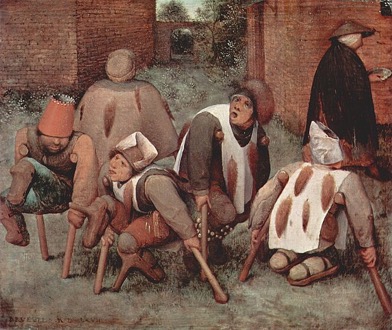
Pieter Brueghel the Elder: The Beggars (1568)
"We're all each others' metaphors here."
Max, our erstwhile kitten now budding house cat, turned up lame evening before last. He and his sister Molly had (as usual) accidentally escaped after I left the slider open and stood on the deck imploring them to come outside, and I noticed Max walking with three legs, just like the three-legged dog on my childhood paper route. That dog chased me like every other dog on that route, seemingly unperturbed over his missing leg. Max held his left front paw immobile and hesitated before heading down the long, steep deck stairs to his favorite flower bed out back. I coaxed him over with a few kitty treats and investigated for obvious damage, but I couldn't see anything troubling in the fading light. I carried him back inside while he complained.
The next morning, he was still avoiding any use of that leg, so I scheduled a visit to the Vet.
Nexting
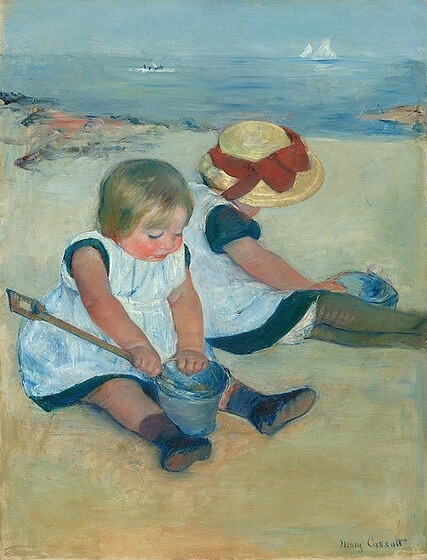
Mary Cassatt: Children Playing on the Beach (1884)
" … I eventually stick my head up and into the clouds."
The GrandOtter rented a POS truck to shuttle herself and her stuff into the next iteration of her life. Balding tires, weary interior, frightening play in the steering wheel, that truck represented everything it should have represented to properly convey her into her next chapter. My right thumb powered my first escape across a hundred miles of scabland and up and over the great Cascades, my possessions contained in a small knapsack and a flimsy guitar case. The conveyance should rightly seem inadequate, for it's not about any present, but whatever comes next. In that moment of separation, the present has already receded seemingly to break trail for its protagonist to follow. These transitions drip with potential and require nothing but the barest shell of conventional support. Another great adventure, a Nexting, commences.
When I arrived on the other side, I discovered that I had been wholly unprepared to properly inhabit the place.
Lasts
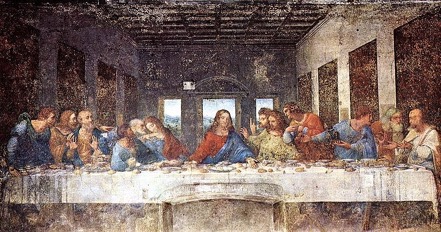
Leonardo da Vinci: The Last Supper (1498)
"Long gone. Never lost."
As a departure nears, before my thoughts shift to whatever might come next, they scan around for Lasts. The last supper. The last breakfast. That last nuzzle from one of those cats who imprinted on me during my stay. I might be here today, but I will most certainly be gone by this time tomorrow, so I try to absorb just as much of the atmosphere here before forfeiting it in favor of fresh adventure. I feel loss most intensely just before the countdown finally concludes. I feel deep tinges. In one of those moments, I swear that I'd abandon every thought of actually departing if that act might freeze everything precisely where it seems to be in that moment. Adventure seems a false promise right then, a down trade. I'd easily barter back my newly-acquired handful of magic beans to recover my reliable old cow.
Time tangles then, for Lasts more properly reside in faulty memory.
EmptyNestoring
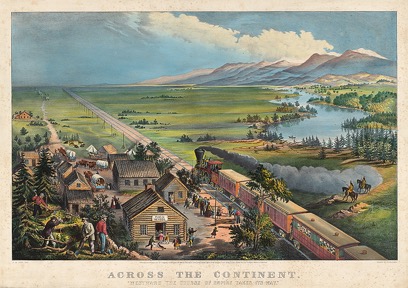
Francis Flora Bond Palmer: Across the Continent:
"Westward the Course of Empire Takes its Way", 1868
[James Merritt Ives (printer), Currier and Ives (publisher)]
"We revere New Beginnings, for only they can turn our fears into our dreams come true."
The grandparent birds seem almost amused at just how confused the exit seems, for they've, between them, done this at least a hundred times. They possess a rhythm between them that would surely guide their wings, but there's no known way to ever transfer that sort of experience. So the fledglings flap and flop their way, first close, then progressively further. None simply fly away. What might have taken a day with experienced wings will likely take a few while learning, remembering what a short time ago flying amounted to simply mounting the edge without ever actually departing before settling back in for another brought-in supper. Chicks grow exclusively exponentially, though, and nesting space eventually disappears. Somebody's finally got to leave, and the nest always was the grandparent birds' place, never theirs. Birth places, even re-birth places, only ever come in the form of future departure points, and one of those points eventually arrives.
"At least they're heading West," you say, since East somehow seems so retrograde.
GhosTown

Jan van Eyck: Saint Barbara (1437)
"I am the ghost haunting this GhosTown."
For many, myself included, errand-running had become our only socialization. We'd either be alone at home or out to the shops. We acknowledged that this form of interaction lacked intimacy, as we only rarely knew those we encountered, but they nonetheless performed a valuable service for us. Their presence proved reassuring that we might not actually be quite as lonely as we usually felt. We could exchange pleasantries with somebody more sociable than a cat while temporarily feeling part of a bustle. Since The Damned Pandemic descended, though, those Main Streets and town centers have ceased attracting. We're more likely to slink around the edges of them rather than attempting anything like our former full immersions. Our social lives have retreated into suspension. We might still warmly anticipate a post office visit if only to revel in the long-familiar context of it, clerks always chatty from standing so very near the center of the universe. One does not very often visit the post office.
I shop as if I were deep sea diving now, checking my gear before entering, and lingering no longer than absolutely necessary.
Dyeignosis
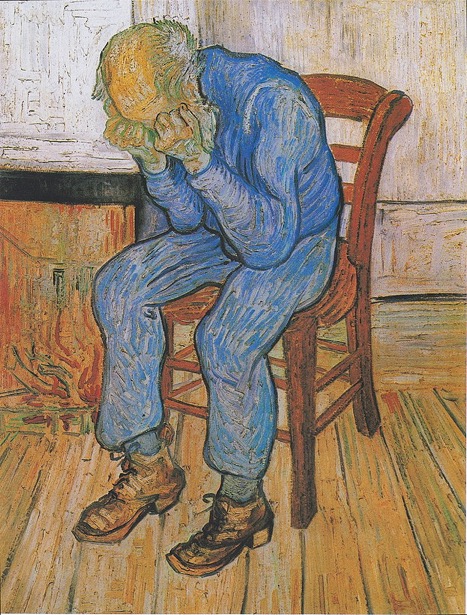
Vincent van Gogh: Sorrowing Old Man (At Eternity's Gate) (1890)
"I am my Dyeignosis, which I acknowledge has been the death of my former self."
I have lived most of my life Dyeignosis-free. This state left me with what many might consider a thin identity, for I found myself unable to sort myself into any of the more popular categories. Allergic to nothing that I knew of, I roamed free of imposed restrictions, enthusiastically joining the Gluten Appreciation Society. I freely consumed peanuts at will. True, through the eighties, during the height of the now-infamous cholesterol terror, I subsisted on skinless chicken breasts and oat groats, but before and after I put most omnivores to shame. I avoided soda pop and fast food, not due to any externally-mandated restrictions, but thanks to what I imagined to have been a refined palate and uncommon sense. While diagnosed with high cholesterol, my identity changed. I became a pre-avenging angel, steadfastly refusing pork and beef, charged with protecting my sacred health. My cholesterol numbers never wavered, regardless of my prescription or exercise routine, and when that life-preserving prescription was recalled as a danger to my health, my doctor and I decided to rescind the earlier dire diagnosis. I slowly re-entered the general population without further restrictions. Once that Dyeignosis devolved back into a recognition of a personal eccentricity, that miserly portion of me withered and disappeared, opening twenty-five years of near perfect health and serenity.
Later, The Muse encouraged me, as only The Muse can encourage anyone, to submit to fresh dyeignoses.
BreakingPoint
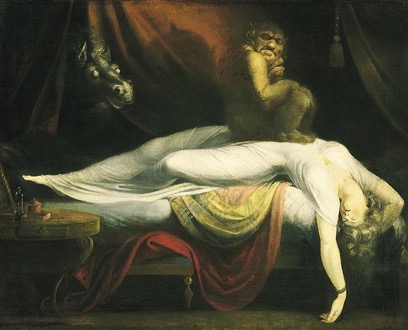
Henry Fuseli: The Nightmare (1781)
"It's a long, hard road."
Every day carries a hint of irrecoverability, each one new and subtly different from every day before it. A very few days arrive carrying the clear threat of a radical BreakingPoint with the past, a clear sense that forever after, no day will likely seem terribly similar again. A death or a divorce brings a dismemberment along with the dread certainty that no subsequent surgery will ever reattach whatever was torn asunder. One wonders What Next? without mustering anything like a reassuring impression of what that might entail. These discontinuities might seem curiously reassuring, marking an end to what had become for almost everyone, an increasingly intolerable situation, but also inject a shit ton of uncertainty into the proceedings. A deeply disturbing unknowing settles in to wait for a fresh opening in the storyline. Above all, everything seems anything but fine in that moment. One proceeds, anyway.
I have been scampering along the eroding cliff edge of just such a BreakingPoint for the last few weeks, terrified over where this story might next take me and those I care about most in this world.
ExitStrategy

Carlos Schwabe: La mort du fossoyeur (Death of the gravedigger) (1895)
"Just imagine the depth of character I'm creating."
Fifty years ago, I was one autumn twilight driving my mother's '63 VW Beetle, which we lovingly referred to as The Helicopter because it sounded like a helicopter, up onto Washington State's Snoqualmie Pass and into a snow storm. An old friend who was riding along dispensed some advice which has since become one of my guiding homilies of life. He said, "Tuck in behind a truck and keep one foot in the ditch." His logic seemed flawless. A commercial truck driver very likely had much more experience than I driving through snow in the dark, and his vehicle was likely much more susceptible to sliding than mine, so a leading truck could serve as my early warning system when the road turned slippery. I should maintain an ExitStrategy anyway, by keeping one foot in the ditch, by remaining prepared to drive myself off to the side should the situation turn truly perilous. I continue this general strategy today, even when it's not snowy. I try to follow someone more experienced than I and I also try to maintain a fallback plan should my pathfinder fail me. I think of this strategy as a form of double indemnity, a compounded form of safety. While everyone else seems most interested in passing every slow-moving truck, I'm more likely to tuck myself in behind so that I can leverage the driver's superior experience.
I try to apply this guideline wherever I'm feeling imperiled, but this Damned Pandemic has foiled my attempts.

